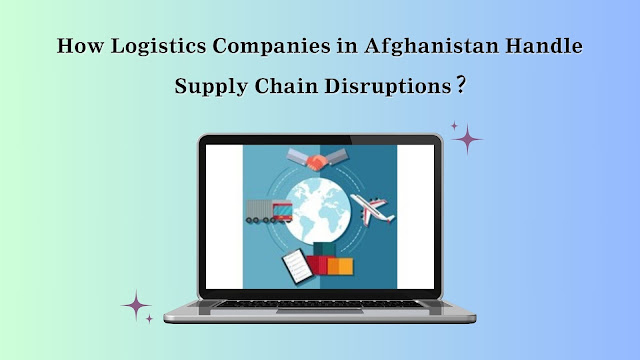Logistics Companies in Afghanistan: How to Leverage Their Services for Business Growth and Increased Benefits?
In the complex world of business, logistics plays a vital role in ensuring smooth operations and timely deliveries. In Afghanistan, logistics companies are stepping up to offer valuable services that are crucial for businesses aiming to expand and grow within the region. Leveraging the services of logistics companies in Afghanistan can lead to significant business benefits, whether you're an entrepreneur, a global enterprise, or a local business looking to enhance efficiency.
Logistics
companies in Afghanistan provide a range of services designed to
streamline the movement of goods from one location to another, both
domestically and internationally. These services often include transportation,
warehousing, inventory management, and customs brokerage. The role of these
companies is indispensable, especially in a country like Afghanistan, which has
challenging terrain, complex border regulations, and varying infrastructure
levels.
By outsourcing logistics
functions to specialized companies, businesses can focus on their core
operations without worrying about supply chain disruptions. This allows
businesses to maintain productivity and reduce operational risks.
Key Benefits of Leveraging
Logistics Services for Business Growth
- Efficiency in Supply Chain Management
Logistics companies are experts in managing supply chains. They utilize
advanced tracking systems, optimized routes, and reliable partnerships
with transport providers to ensure that goods move smoothly and
efficiently. This can significantly reduce delays and improve the overall
reliability of your business operations.
- Cost Savings While it may seem like a large
investment to hire a logistics company, the long-term cost savings are
substantial. These companies have economies of scale, access to
competitive rates with transport and shipping providers, and optimized
processes that reduce wastage. This translates into lower transportation
and operational costs for businesses, helping to boost profitability.
- Improved Delivery Times With the
unpredictable nature of Afghanistan’s infrastructure and security
challenges, relying on a logistics company that understands local dynamics
is crucial for meeting delivery deadlines. Logistics companies in
Afghanistan have the knowledge and experience to navigate these challenges
efficiently, ensuring that your products reach their destination on time,
no matter how remote.
- Better Access to International Markets
Afghanistan’s strategic location between Central Asia, the Middle East,
and South Asia offers businesses an opportunity to tap into international
markets. Logistics companies in Afghanistan can help businesses leverage
this geographic advantage by managing cross-border shipments, ensuring
smooth customs clearance, and reducing time-to-market.
- Risk Mitigation Afghanistan’s political and
economic environment can be unpredictable, which often affects logistics
operations. By working with established logistics companies, businesses
can benefit from their local expertise and risk management strategies.
These companies are adept at navigating political instability, security
concerns, and other risks that may disrupt the supply chain, providing
businesses with peace of mind.
Conclusion
Logistics companies in
Afghanistan are more than just service providers; they are strategic partners
for businesses looking to expand and grow. Whether you're aiming to reduce
operational costs, improve delivery timelines, or tap into international
markets, leveraging the services of a logistics company can unlock numerous
benefits. By choosing a reliable logistics partner, businesses can streamline
their operations, enhance customer satisfaction, and ultimately achieve
sustainable growth.




Comments
Post a Comment